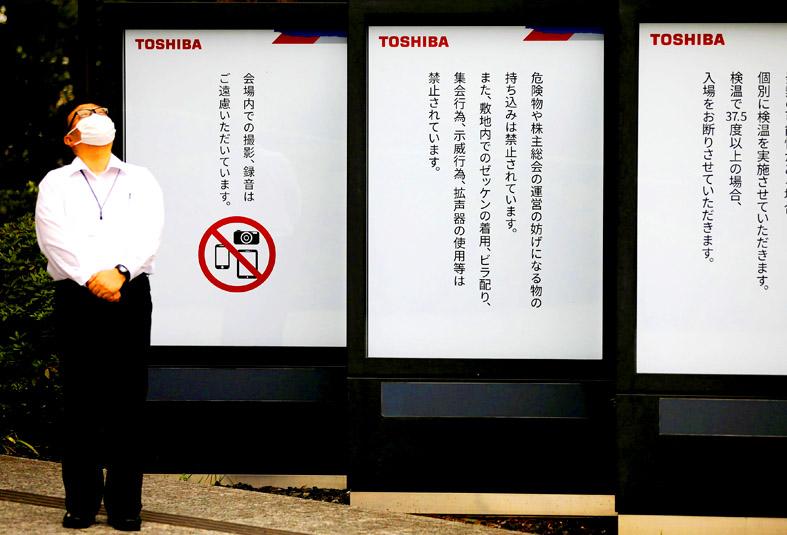Toshiba Corp would split into three separate companies as part of an effort to improve shareholder value, the company said yesterday, responding to pressure from activist shareholders after years of scandal and mismanagement.
The Tokyo-based company said it would separate core operations into two new publicly traded companies, one for infrastructure services and another for technology devices.
The remaining Toshiba business would hold its stakes in memorychip pioneer Kioxia Holdings Corp and Toshiba Tec Corp.

Photo: Reuters
The goal is to complete the spinoffs by the second half of fiscal 2023.
The company also plans ¥100 billion (US$877 million) for shareholder returns over two years, it said.
Toshiba Corp plans to monetize its stake in Kioxia and “return net proceeds in full to shareholders,” it said.
“Over our more than 140 year history, Toshiba has constantly evolved to stay ahead of the times,” Toshiba Corp chief executive officer Satoshi Tsunakawa said. “Today’s announcement is no different. In order to enhance our competitive positioning, each business now needs greater flexibility to address its own market opportunities and challenges.”
Toshiba Corp, an icon of corporate Japan, has been mired in controversy for years, dating back to at least 2015, when it had to pay the country’s largest penalty ever for falsifying financial statements.
It followed with an ill-fated foray into the nuclear energy business that forced it to take a US$6.3 billion write-down and sell off its crown jewel memory chip business.
Activist investors led by Effissimo Capital Management Pte began circling as losses mounted.
They pushed for a shake-up of the company’s board, including a resolution to get Effissimo cofounder Yoichiro Imai a position as director.
Last year, Toshiba Corp repelled the activists at its annual shareholders meeting, winning a clean sweep of its own board nominees.
However, an independent investigation later found that the company management had tapped Japanese government allies and worked hand in hand with public officials to sway the outcome of the voting.
The three-way split is among the most radical actions taken by a large Japanese company to address the so-called conglomerate discount.
It is common in the country that one company manages a wide range of businesses, a strategy that has fallen out of favor in the rest of the world and is often criticized for depressing share prices and hurting innovation.
Firms typically reject such calls for change, saying that keeping businesses together helps them weather downturns and societal shifts.
Sony Group Corp, for example, has said that it was able to achieve its highest ever profit due to strong PlayStation units, even when its sensor unit took a hit from a drop in orders from China’s Huawei Technologies Co (華為).
Toshiba Corp said the new infrastructure unit would include its energy systems and solutions division, its digital solutions division, and battery businesses, among others.
The new devices company would include electronic devices and encompass power semiconductors, semiconductor manufacturing equipment and high-capacity hard disk drives.
It estimates that the infrastructure business would have revenue of ¥2.09 trillion in the current fiscal year, while the devices company would have revenue of ¥870 billion.

South Korea’s equity benchmark yesterday crossed a new milestone just a month after surpassing the once-unthinkable 5,000 mark as surging global memory demand powers the country’s biggest chipmakers. The KOSPI advanced as much as 2.6 percent to a record 6,123, with Samsung Electronics Co and SK Hynix Inc each gaining more than 2 percent. With the benchmark now up 45 percent this year, South Korea’s stock market capitalization has also moved past France’s, following last month’s overtaking of Germany’s. Long overlooked by foreign funds, despite being undervalued, South Korean stocks have now emerged as clear winners in the global market. The so-called “artificial intelligence

‘SEISMIC SHIFT’: The researcher forecast there would be about 1.1 billion mobile shipments this year, down from 1.26 billion the prior year and erasing years of gains The global smartphone market is expected to contract 12.9 percent this year due to the unprecedented memorychip shortage, marking “a crisis like no other,” researcher International Data Corp (IDC) said. The new forecast, a dramatic revision down from earlier estimates, gives the latest accounting of the ongoing memory crunch that is affecting every corner of the electronics industry. The demand for advanced memory to power artificial intelligence (AI) tasks has drained global supply until well into next year and jeopardizes the business model of many smartphone makers. IDC forecast about 1.1 billion mobile shipments this year, down from 1.26 billion the prior

NEW IDENTITY: Known for its software, India has expanded into hardware, with its semiconductor industry growing from US$38bn in 2023 to US$45bn to US$50bn India on Saturday inaugurated its first semiconductor assembly and test facility, a milestone in the government’s push to reduce dependence on foreign chipmakers and stake a claim in a sector dominated by China. Indian Prime Minister Narendra Modi opened US firm Micron Technology Inc’s semiconductor assembly, test and packaging unit in his home state of Gujarat, hailing the “dawn of a new era” for India’s technology ambitions. “When young Indians look back in the future, they will see this decade as the turning point in our tech future,” Modi told the event, which was broadcast on his YouTube channel. The plant would convert

People stand in a Pokemon store in Tokyo on Thursday. One of the world highest-grossing franchises is celebrated its 30th anniversary yesterday.